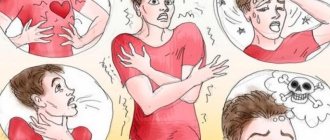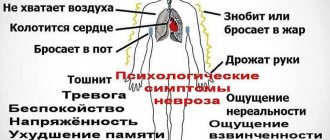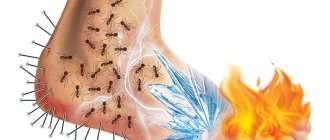Frequent urination as a symptom of neurosis
Pathology can manifest as heaviness in the urinary area.
- heaviness in the bladder area;
- paruresis (impossibility of starting the process of urination in public);
- lack of bladder sensation;
- going to the toilet not according to need (to fill the bladder), but according to time;
- lower back pain;
- pain in the genital area;
- urine is released in small volumes.
Developing nervous cystitis in a woman can manifest itself in different ways, depending on individual physiological characteristics.
Frequent urination is also typical, but the opposite effect is also possible - urine retention. The very process of urine leaving the body can become painful and unpleasant. Itching and colic may begin in the perineum. In chronic cases, the urine may contain blood. In such a situation, contacting a doctor should be urgent. Since problems in the functioning of the bladder appear in violation of the urinary process, first, the doctor, with the help of research, inspects whether there are any physiological disorders. After all, frequent urination appears due to various physiological diseases, for example, against the background of prostatitis.
When the results of examinations showed the absence of pathologies in the functioning of the urinary system, the term “neurosis” is used. As follows, the pathology did not appear due to a malfunction of the bladder or organic damage to nerve cells, but is based on a “failure” in the functioning of the nerves. There are many reasons for frequent urination due to nervousness. Here are some of them:
- Excessive muscle tension. In stressful situations, the muscles are in an overstrained state, and at the same time puts pressure on the bladder. This becomes a prerequisite for a frequent desire to visit the toilet.
- Intrusive thoughts. People with neurological disorders become afraid of their own physical feelings. “On the nerves” they draw terrible pictures in the imagination and, as a result, all thoughts are focused on the desire to urinate.
Bladder problems occur at any age in both children and adults. They cause a lot of trouble because you have to constantly go to the toilet. This is especially unpleasant if a person does not have the ability to regularly visit the restroom. In children, such a problem can cause complexes and psychological disorders.
Urination can be disrupted by various physiological conditions, such as, for example, prostatitis. To diagnose the circumstances of the disorder, the doctor usually prescribes a series of tests to make sure that there are no physical obstacles or problems with the urinary system.
The term “neurosis” is used when examinations demonstrate that a person does not have any problems with the urinary system. This means that the root of the difficulty lies not in some organic damage to the nerve cells, bladder, cerebral circulation, etc., but in a nervous “failure.” In other words, it is not a physical illness, but a psychological one.
The autonomic nervous system, its sympathetic and parasympathetic divisions are responsible for the functioning of the bladder. The first one reduces the sphincter fibers and, thus, retains urine. Parasympathetic nerves, on the contrary, relax the sphincter and reduce the walls of the bladder so that urine can leave the bladder relaxed.
Negative emotions - horror, anxiety, worry, shame - can lead to overexcitation of one of the departments of the nervous system. As a result, a “clamp” of the sphincter appears and pathological urinary retention, or overstrain of the bladder walls and an “extraordinary” urge.
Urinary disorder occurs for various reasons, but the result is always the same. Disharmony affects all areas of a person’s life - the quality of work decreases, stress arises, things get worse for family and friends, and almost everything else. All this can appear at any moment.
In the case of paruresis, if the disease is not cured, complications such as damage to the bladder and kidneys may occur.
We need to find solutions to this problem, and not remain silent about it. Indeed, for many, the topic of bladder neurosis is forbidden - there is neither the strength nor the desire to discuss it with loved ones, which leads to an even further aggravation of the situation.
Neurosis (or as it is also called neurotic disorder) is the general name for a group of certain multifunctional psychogenic reversible disorders. Neurosis has a direct tendency towards a protracted course. Today, neurosis is characterized by a decrease in intellectual and physical performance.
In most cases, it manifests itself in the form of hysteria or frequent variants of annoying behavior and is an asthenic state of a person. Neurosis is directly related to the state of the nervous system, and if a person has experienced any strong experiences, stress, or had some other impact on the nervous system, then the possibility of the appearance of nervousness increases.
The main prerequisites for neuroses:
- Strong physical or intellectual stress, expressed in constant work, without the ability to rest for a long time. The appearance of the unchangeable, i.e. acquired stress, as well as a strong spiritual experience associated with problems in personal life. The combination of these reasons gives a double effect in the development of neurosis.
- Severe exhaustion of the nervous system due to the inability to complete a certain task or solve a problem that has arisen. In this case, a neurosis clinic can help.
- A busy work schedule, without the ability to rest, or the inability to rest.
- An innate tendency to rapid fatigue, and then overwork.
- Abuse of alcohol or drugs leads to the rapid formation of neurosis. Here again we need a neurosis clinic, but only after getting rid of addiction.
- One of the diseases accompanying nervousness are those that greatly deplete the body, and namely the immune system.
The main symptoms of neurosis are divided into psychological and somatic.
- Emotional stress, often manifested in the form of annoying thoughts and annoying actions that arise without visible circumstances.
- Acute reaction and unpreparedness for stressful situations. If some people react to this with tearfulness or anger, then with neurosis a person becomes fixated and withdrawn. Constant experiences and worries without apparent circumstances. There may be the development of phobias. It is very important to immediately begin healing neuroses as soon as you see such a symptom. It may be that in the neurosis clinic they will offer you long-term healing of phobias and neuroses, but in ours, with the introduction of the EMAT technology, getting rid of neurosis almost always occurs in 1-2 sessions.
- Rapid fatigue, acquired lethargy. People with rapid fatigue also need treatment for neuroses. You can talk about rapid fatigue if you have just started work, and your memory is already starting to work worse, your attention and mental capabilities are getting worse.
- Extra sensitivity to sudden changes in temperature, also to bright light and very loud sound.
- The emergence of complexes about one’s own communication, low or very high self-esteem.
- Also in need of treatment of neuroses are people who suffer from such phenomena as uncertainty or inconsistency; people who completely mistakenly set current values also determine their preferences.
- Just a changeable mood depending on trifles. Powerful irritability.
- Sharp pain in the head. The tummy area, also the heart. Healing neuroses will benefit people who have seen that their muscles and joints have begun to ache very much for no apparent reason. Frequent urination and trembling hands can also be the first symptoms of neurosis.
- Rapid fatigue with a small amount of work. A sharp or gradual decrease in performance caused by drowsiness and darkening of the eyes.
- The occurrence of VSD (vegetative-vascular dystonia), frequent dizziness, and darkening of the eyes, which contribute to disorientation.
- The occurrence of sweating in acute forms, as well as a decrease in potency and exacerbation of prostatitis.
- In some cases, neurosis manifests itself in a violation of the vestibular apparatus, i.e. dizziness occurs with elements of sharp darkening in the eyes.
- It doesn’t matter what form of appetite disturbance (excessive consumption or undereating of food, as well as rapid satiety of the body).
- It doesn’t matter what form of sleep disturbance, be it insomnia or rapid retreat into deep sleep. Sleep without the deepest stage, superficial sleep, accompanied by rapid awakening. Feelings of lack of sleep or nightmares.
- Strong sensory trauma caused by worry about one’s own health.
- The emergence of psychogenic bulimia.
The healing of neuroses must be done on time, otherwise concomitant diseases may appear. With neurosis, a hysterical state often appears, an invariable depressive state, and there may also be a manifestation of panic attacks or panic disorders and accompanying phobias.
Then these and other symptoms can be expressed in acquired neurosis, which an ordinary neurosis clinic cannot cure, but even such a neurosis can be eliminated thanks to the EMAT technology. Usually. A neurotic state contributes to the deterioration of working ability or completely takes away the opportunity to work.
- Sensual anxiety is expressed in constant thoughts about an irreparable situation, about certain people, or in anticipation of bad events. In a word, people suffering from sensory apprehension expect failure more often than others.
- Physical anxiety is expressed in muscle tension, and this form of anxiety does not allow a person to relax.
- Motor anxiety is expressed in impatience. A person cannot sit in one place for a long time, and he needs to be constantly on the move. Constant twitching of the legs is the first and most basic sign of motor agitation.
It has been proven that cystitis can appear due to nervousness
Medical scientists have proven that psychological problems are closely related to the functioning of the bladder. It is important to determine the main cause of cystitis as early as possible.
Causes of psychosomatic cystitis
A person’s emotional state and his health are closely related. Not only illness arises from strong experiences or negative emotions. A relapse of the pathology may occur. Cystitis can occur against a background of loss, rage, anger, fear or loneliness. Many people have noticed that it was because of nervousness that they began to experience difficulties with the urination process.
Cystitis may occur due to loss, rage, or anger
Nervous cystitis affects people who often keep their problems to themselves; they have no one to talk to and discuss their painful troubles.
Even a painful break in a relationship or at the very beginning can provoke violations, because a person is very worried about the current circumstances.
Representatives of the fair sex often turn to qualified specialists with bladder problems after serious stress with their men.
There are three main reasons that cause symptoms of cystitis:
- A person is constantly under stress.
- The patient is haunted by negative emotions and may be under their influence for a long time.
- There are serious and prolonged conflicts of a sexual nature.
Moreover, there are numerous factors that enhance the development of pathology.
These include:
- hypothermia of the body;
- insufficient amount of vitamins;
- lack of nutrients in the body.
Clinical picture
Painful sensations in the abdominal area
Neurogenic cystitis is very similar in its symptoms to inflammatory pathology. Among the characteristic manifestations are the following symptoms:
- frequent urge to urinate;
- painful sensations in the lower abdomen, sometimes moving to the lumbar region;
- dystrophic disorders associated with the functioning of the excretory system.
Due to improper functioning of the bladder, the patient develops psychological disorders. An inferiority complex appears and the person cannot live normally. He is constantly disturbed by negative experiences and phobias.
Incorrect or untimely treatment leads to complications developing. Violations can result in pyelonephritis, urolithiasis, and chronic renal failure.
Cystitis in women
against a background of severe stress, it may appear unexpectedly. Despite the absence of characteristic symptoms or chronic inflammatory process, the disease develops. This is explained by the fact that the main reason lies in previously suffered pathologies.
There may be a difficult birth or surgery. An increased urge to urinate is accompanied by signs of a depressive disorder. The symptoms of nervous cystitis will not go away on their own. Qualified help and effective treatment are required.
It can be prescribed by a urologist or psychotherapist.
In the case of the male body
Bladder problems are more common among older people. The main reasons are impaired prostate function, increased physical activity, constant fatigue, and poor sleep. Clinical symptoms are similar to signs of the development of infectious cystitis or prostatitis.
In children
a similar diagnosis is established after reaching the age of two.
The pathology can be congenital or provoked by external factors. During labor, the nerve endings that control the bladder can become damaged.
As a result, problems arise. Treatment of children is carried out using medications of the most gentle category.
Treatment of nervous cystitis
In most cases, qualified specialists recommend paying attention to strengthening the nervous system. It is important for patients to be positively disposed towards a full recovery. Treatment of cystitis due to nerves includes:
- Elimination of any stressful situations. It is important to get out of a depressed state and forget about conflicts. The patient's inner mood plays a huge role in therapy.
- A psychologist or psychosomatician recommends that his patients get rid of all negative emotions in any way. Free your heart from grievances, burdens, speak out to others. Avoid anger, as well as people, at the sight of whom fear and feelings of anger appear. It is necessary to fight low self-esteem.
You won’t be able to get rid of a nervous condition on your own, especially if it affects a person’s internal organs. You will need the help of a qualified specialist.
Drug treatment
Treatment with medications
Timely treatment of nervous cystitis helps to completely get rid of the disease. Medications can relieve symptoms of the development of pathological processes, alleviate the patient’s condition, and prevent complications and consequences.
To combat inflammatory processes, appropriate drugs, antibiotics or adrenergic blockers are used. In some situations, doctors additionally prescribe injections. Drug treatment ends with a course of vitamins, which help restore the body's defenses and eliminate the negative consequences after taking medications.
Homeopathy and herbs
At the early stage of cystitis development, homeopathic medicines and traditional medicine recipes (herbal remedies, herbal infusions) can be used as therapeutic agents. They have a sedative and anti-inflammatory effect, support the immune system, as well as bladder function.
Particular attention is paid to lingonberry leaves, which alleviate the patient’s condition. But such therapy shows high effectiveness if there are no serious complications.
Physiotherapy
Various manipulations are used to combat bladder inflammation. Procedures with ultrasound or electrical signal, heating, vibration massage. Physical therapy supports muscle function.
During electrophoresis, the medicine is delivered to the site of development of the inflammatory process. With magnetophoresis, treatment is carried out using a magnetic field. Ultrasound has a positive effect on blood circulation in the pelvic area. Also has an anti-inflammatory effect.
Source: https://zen.yandex.ru/media/id/5b569fc8f1314200a91e1d10/5b595ee29e4a5000aaabec61
Why does neurosis occur?
Various types of disorders develop due to the presence of other pathologies: prostatitis, cystitis, pyelonephritis. To exclude these causes of symptoms, the specialist will prescribe the necessary examination. If diseases of the bladder and genitourinary organs are not identified, then a diagnosis of Bladder Neurosis is made.
The sympathetic and parasympathetic parts of the nervous system are responsible for the functioning of the urinary tract. The first forces the fibers to contract, preventing urine from escaping.
Another section is responsible for relaxing the muscles that hold the sphincters. Its activity can provoke contraction of the inner walls of the bladder. This helps urine pass smoothly through the ureteral canal.
This condition is not considered a disease, but a psychological disorder. It is caused by stress, severe fears, and various emotions of a vivid nature. From strong excitement, the nervous system is overloaded, any of its departments can become very excited. This is how one of the types of neurosis develops.
Causes of the disease
Often a person screws himself up and looks for reasons for stagnation of urine, or vice versa, on the Internet. Where, of course, he finds his illness and begins to convince himself that it is his illness. Subsequently, he can prescribe himself a diagnosis and the “correct” treatment.
Impaired urination occurs not only due to bladder neurosis. With prostatitis, the two sphincters swell and make it difficult to pass urine. Some medications have a diuretic effect, as a result of which a person often goes to the toilet. Other drugs act diametrically opposite; they make it difficult for urine to pass out.
The bladder works thanks to the autonomic nervous system and its two divisions: the sympathetic
and
parasympathetic
. One contracts the sphincter fiber, causing urine retention. The second section relaxes the sphincter, so the walls of the bladder contract, which helps urine come out.
Negative emotions contribute to tension and arousal of the sympathetic or parasympathetic department. Because of this, the sphincter stops functioning normally and urine is either retained or frequent urges occur.
Before diagnosing the disease, the doctor sends the potential patient for urine tests
. If everything is fine with the tests and there is no suspicion of other diseases, the person is diagnosed.
How does frequent urination with nerves manifest?
This problem has another name - urinary cystalgia. But there are no general reasons linking it with cystitis. The only signs that are similar are those that indicate the emergence of a problem and signal that a course of treatment should be started urgently.
Frequent desires to urinate or false sensations are the most likely symptoms confirming the development of bladder neurosis. The patient begins to understand that he cannot control the output of urine himself. For this reason, symptoms appear, characterized by the sensation of urine not being released in full.
Patients may complain that they no longer feel their own bladder. This is aggravated by the forced measure of going to the toilet on a schedule, without waiting for the urge to do so.
At such moments, pain begins to occur in the lower abdomen, in the lumbar region, above the pubis or in the perineum. Pain can occur at any time.
The process of urination may be accompanied by discomfort and pain.
Stress urinary incontinence
Stress incontinence is urination when a person does not plan to. Such symptoms are most often present in women during tension or stress. This is associated, in most cases, with a decrease in sex hormones and weakness of the pelvic floor muscles. But there are other kinds of situations.
In the normal state of the genitourinary system, the urge to urinate first arises, the brain receives a signal, and the person goes to the toilet to empty the bladder. But there are certain situations when, in patients with neurological diseases, the signal does not reach the brain, and the bladder begins to contract spontaneously.
This happens with multiple sclerosis. And the examination that needs to be done in this case is magnetic resonance imaging of the brain. In some situations, bladder neurosis with urinary incontinence may occur due to damage or disease of the spinal cord.
How to distinguish bladder neurosis from other diseases, its symptoms and treatment
Neurotic-type disorders are simply treatable. The doctor prescribes short-term use of tranquilizers or anti-stress drugs. But the use of medications and antidepressants relieves the symptoms of neurosis for a short period of time, but to achieve a more effective result, subsequent techniques should be used.
- Once a day, practice muscle relaxation techniques, paying most attention to the muscles of the thighs, abdomen and buttocks.
- Creation of a personal program for psychotherapy.
- Reduce the amount of water consumed and slightly increase salt intake.
- Reducing stress on the body through relaxation.
With alternate and constant implementation of all methods of therapy, you can quickly achieve positive healing results. An important factor in healing is the “voluntary” implementation of all techniques. There is no need to force someone to do everything “through force”, because the effectiveness of such healing is zero.
First, you will need to find out the cause of the difficulty in order to remove it, because otherwise it will not be possible to improve the situation. The doctor will need to find out whether the person had any stress or heavy loads that influenced the development of neurosis, and then prescribe a course of treatment.
Medications will include sedatives and drugs to eliminate the consequences of the pathology. These include medications and special antiseptics. In more serious cases, catheterization will have to be performed to remove stagnation of urine. To improve the effect of the course of therapy, it is better to go to nature or just lie at home listening to quiet music.
For children and adults in a languid psycho-emotional state, the specialist will recommend undergoing a course of treatment with a psychiatrist, because it is not so easy to remove psychological disorders. Usually such therapy brings good results, so there is no need to be embarrassed about going to a specialist.
Frequent urination due to neurosis is a fairly common occurrence, and when the first symptoms appear, it is necessary to begin healing immediately. Otherwise, people will have languid consequences that cannot be removed with sedative products and antiseptics.
Bladder neurosis can manifest itself in the form of two different symptoms.
- The first - more common - is psychogenic urinary retention (paruresis). A person with symptoms of paruresis finds it difficult or impossible to urinate in the presence of other people. This is a fairly widespread problem, often first appearing at school.
- The second symptom is a constantly felt urge to go to the toilet, increasing as a result of nervous tension, as well as more frequent urination. This manifestation of neurosis is often called nervous (neurogenic) bladder syndrome, although this is not an entirely correct name.
Both forms of neurosis are accompanied by different types of fears of social shame. They are quite common types of social phobia, ranking second after the horror of public speaking.
You may not show it, but you feel isolated, constrained and insecure due to the manifestations of bladder neurosis. It always seems that if people around you find out about your dilemma, they will start laughing at you.
That is why it is very important to start finding ways to combat this disorder in order to be able to lead a normal lifestyle. The disease cannot be ignored because it can lead to severe disruptions in work and communication, and also affect the sense of self-confidence and the ability to travel.
But don't despair! There are ordinary, but effective, methods of combating this disorder. With all this, you don’t have to spend a lot of money or go to the doctors!
In the article, we will analyze what bladder neurosis is, how to distinguish it from other common diseases, based on symptoms similar to neurosis. How does this type of neurosis manifest in children and adolescents? And most importantly, what to do in this situation, which doctor to go to and how to treat it?
To get rid of neurosis, it is necessary to carry out a long course of treatment. It will consist of the use of medications, special gymnastic exercises, and physiotherapeutic procedures. Sometimes a psychotherapist is also prescribed.
To defeat the disease, you can deliberately provoke circumstances in which it is difficult to relax and go to the toilet, and try to overcome them. For example, ask someone nearby to be near the toilet door when the patient enters.
When the patient calmly empties his bladder, not paying attention to the person standing under the door, it is necessary to begin a new stage - start visiting a public toilet. At the first stage, a place that is not too crowded is selected, with a booth that has some kind of sound insulation. Gradually the place to visit becomes more complicated.
When fighting neurosis, you should determine the harmony in your own body. The patient should learn to relax his own nervous system, not paying attention to irritating factors.
For this purpose, relaxation options are developed that take into account the individual characteristics of each patient. For example, for some, a simple distraction from the world around him and the harmless addition of numbers in his mind will be sufficient. It is very important not to panic and fight your own fear.
Medications are almost never used in the treatment of bladder neurosis.
Compositions of a calming nature can be prescribed to help stabilize the functioning of the nervous system - Valerian, Persen. In cases where the pathology is severe, stronger medications are prescribed in the form of tranquilizers or antidepressants.
To prevent the occurrence of concomitant diseases, the patient may be prescribed antibiotic therapy. To alleviate your general condition and get rid of thoughts about visiting the toilet, you should significantly limit your liquid intake, lowering the norm to one and a half liters per day.
Modern diagnostic methods
Initially, the doctor interviews the patient, finding out the period of onset of the disease, symptoms and sensations. Diseases that the person had previously suffered are also determined, against the background of which nervous cystitis could develop. The doctor finds out what medications the patient has taken or is taking. Next, a visual examination of the genital organs occurs.
It is very important to undergo laboratory and instrumental tests when identifying signs of urinary neurosis. The laboratory method involves passing the necessary tests.
Ultrasound of the bladder and kidneys, cystoscopy, and urodynamic studies are considered excellent methods of instrumental examination.
Pathogenesis
Bladder neurosis is not accompanied by physiological disorders in the structure of the organs of the genitourinary system. When taking tests, foreign microorganisms are not detected in the urine.
Urine is released due to relaxation and contraction of internal muscles. These processes are controlled by the autonomic nervous system. A person does not consciously control them. The sympathetic and parasympathetic departments, controlled by the ANS, malfunction, so urinary retention or incontinence occurs. The sympathetic part of the brain signals the muscles to contract and the sphincter closes. The parasympathetic department is about relaxation, and it opens.
Healing pathology
To decide whether to choose medical or surgical treatment, a comprehensive examination is necessary. It is unacceptable to let the patient withdraw into himself and deny the presence of the disease; this is fraught with infectious complications, rupture of the bladder and the transition of neurosis to a chronic form. If organ malformation and central nervous system injury are excluded, the following tests must be done to reveal latent conditions:
- Ultrasound;
- urography;
- general urine analysis;
- detailed blood test;
- biochemistry;
- analysis according to Nechiporenko and Zimnitsky.
Based on the results, treatment for a neurological disorder or bladder disorder is organized. It is carried out jointly with a urologist and neurologist. The set of measures involves, at the first stage, identifying the psychological cause of the pathology and curing it with the help of antidepressants, antipsychotics, and sedatives.
Therapeutic treatment is aimed at eliminating inflammation with the help of antibiotics and uroseptics, painkillers, immunomodulators and vitamin complexes. Effective procedures are reflexology, electrophoresis and ultrasound treatment. In some cases, a catheter may be used.
In severe cases of the disease, surgical intervention is possible; it helps to strengthen the muscles of the bladder and increase the elasticity of the walls. Giving up bad habits, following a diet, and staying in the fresh air contribute to treatment.
Signs of pathology in children are recorded at 3-4 years of age, when young patients are already able to control urination. Parents should be attentive to the behavior of children at this age. You need to worry about bedwetting in time, maybe the cause will not be critical yet. It is better to treat the disorder in early childhood.
For young patients, natural-based sedatives containing motherwort, chamomile, lemon balm, fireweed, and valerian are recommended. They can be taken for a long time, the result comes in a few weeks. For positive dynamics, you need to organize the correct daily routine for the child, daily walks, and normal nutrition.
It is necessary to exclude emotional trauma and stress; you should not punish a child for wet pants. For a complete cure, parents need to show tact and maximum patience, then they will be able to overcome the problem without shock and help the child in social adaptation.
Diagnostic examination
To make a final diagnosis, differential diagnosis is required to exclude classic cystitis. It is very important to identify possible neurogenic disorders. A urologist and gynecologist collect a detailed medical history and conduct an in-depth examination of the woman. At the same time, there is a need to involve an endocrinologist, neurologist, psychotherapist, sex therapist and other specialists in the examination.
Set of diagnostic measures:
- Analysis of the chemical composition of urine. With cystalgia, the leukocyte level should be within normal limits.
- Magnetic resonance imaging and ultrasound examination of the genitourinary organs are indicated. The equipment will detect possible polyps and other pathological changes in the structure of the bladder.
- The functionality of the urinary organs is studied through urodynamic studies, cystography, excretory urography, and radioisotope renography.
- Cystoscopy is indicated.
- Analysis of hormonal status.
- Conducting a personal conversation with a woman, during which the doctor clarifies details about the nature of her intimate life.
- Data on previous gynecological pathologies and operations, the number of abortions, and the menstrual cycle are taken into account.
Such a detailed diagnosis allows you to fully assess the woman’s condition and establish the exact causes that led to the disease. Based on the results of the examination, appropriate treatment is selected.
Features of the pathological process
A child may develop urinary disorders due to high hormonal activity, heavy physical exertion, bladder atony, traumatic brain injury, infectious diseases of the nervous and excretory systems. Pathology is divided into two types: hyporeflex and hyperreflex.
A disorder of the first type is indicated by incontinence, frequent and strong urge to go to the toilet, and a small volume of urine in the bladder. Enuresis develops. The second type is characterized by fluid retention, stretching of the organ and its incomplete emptying, and constant leakage.
Neurosis entails the appearance of complications and the addition of infections:
- renal failure;
- constipation;
- inflammatory processes in the bladder and urethra, chronic cystitis;
- pyelonephritis;
- reflux;
- nephrosclerosis;
- intoxication of the body.
In the absence of proper treatment, disability may occur.
First, the specialist will need to find out whether there are any physiological preconditions that cause difficulty urinating. After all, due to various pathological processes and problems with the kidneys, a person may experience stagnation of urine. To heal, you will have to remove the factor that caused the problem and take diuretics (diuretics).
With bladder neurosis, there are no physiological disorders and the urinary tract is without pathologies. The essence of the problem lies in the malfunction of the nervous system, which is why doctors classify this pathology as a disease caused by a mental disorder.
The outflow of urine is achieved through 2 sphincters in the bladder, which relax and contract when necessary. The process is controlled by the autonomic nervous system (ANS), in other words, a person consciously cannot control the process.
The following sections of the ANS are responsible for the work of sphincters in the bladder:
- Sympathetic. It serves to contract muscles and, accordingly, to close the sphincter. Thanks to the sympathetic department, a person can retain urine in the body;
- Parasympathetic. It is designed to relax muscle tissue, including the sphincter. Specifically, the parasympathetic department serves to remove urine from the body.
If a person experiences problems in these departments, then all the blame lies with bladder neurosis and it is necessary to know its symptoms and methods of treatment, especially when the problem appears in children.
Causes of cystalgia
In people with an unstable psychological background, neurosis and urination are closely interrelated. Urological disorders can be a consequence of gynecological diseases in women (ovarian dysfunction, result of abortion, menopause, hormonal disorders), physiological disorders (prostatitis) in men, they are caused by factors of a mental nature (conflicts, dissatisfaction with sexual life), allergic reactions, blood disorders. and lymph circulation in the bladder.
Incontinence, like urinary retention, also occurs in children, which is associated with spinal disorders and atony of the bladder muscles. Cystalgia in a child is associated primarily with adults. Severe fear or fear of punishment by a parent or teacher for accidental urination leads to frequent enuresis or false urge to go to the toilet.
After surgical interventions in the pelvis, as a result of decreased immunity, the likelihood of bladder neurosis also arises; treatment of the disease should be closely related to identifying the cause. An unstable psychological background develops mostly in women who have had cystitis, vaginitis, and are susceptible to hypothermia and inflammation.
To diagnose the disorder, a urologist tests the patient to confirm the origin of the urinary problem.
If the examination confirms that the urinary tract is normal, we are talking about neurosis. The functioning of the bladder is controlled by the sympathetic part of the autonomic system, which contracts the sphincter and holds back urine, and the parasympathetic part: it relaxes the sphincter and contracts the walls of the bladder so that the person can calmly relieve himself. Overexcitation and emotionality can lead to “clamping” of one of the departments and pathological retention of urine or uncontrolled urine output.
Consequences
If, after identifying the first symptoms, you do not begin to heal the problem, then unnecessary effects will arise due to it, such as:
- Low performance;
- Constant stress and stress;
- Quarrels with loved ones and acquaintances
Such consequences are not the worst, because without proper treatment, the kidney or bladder may be damaged due to delayed urine output. This problem is especially important for children, because they can be embarrassed by their own problems and endure until the last moment. Parents in such a situation should be attentive and make sure that their baby does not have symptoms of the disease.
My office How to cope with depression without the help of others 12/10/14 | CATEGORY: Depression | Now we will talk about how to get out of depression without the help of others. Obviously, these tips are unlikely to suit those who are affected by the languid form of this disease. In this case, calling the doctor is the only reliable method to solve the problem. This article is addressed to those who at times experience relatively mild periods of depression.
The news was added: 04/07/2015. 09:13
Temperature during transition neurosis: 9805
Recurrent depression Transitions: 849
Phenibut for depression Clicks: 1519
Neurosis of Kurpaty Transitions: 2165
Neurosis according to Pavlov Transitions: 6383
Mental test for depression Hits: 3997
How to avoid postpartum depression Hits: 5845
Neurosis of Purity Transitions: 6963
Hypochondriacal depression Transitions: 1794
Kurpatov neuroses Transitions: 4507
Volokolamsk Highway Clinic of Neuroses Transitions: 3678
Endogenous depression symptoms Transitions: 93
How long does the neurosis last? Transitions: 5602
Symptoms of neurosis of annoying states Transitions: 3741
Healing neurosis of the pharynx Transitions: 5915
It must be remembered that urinary neurosis can result in serious problems. Despite the causes of the disease, discomfort in each case can penetrate into any area of a person’s life. Performance problems occur and quality decreases. A person experiences numerous stresses that he is no longer able to cope with on his own.
Against the background of increased irritability, quarrels with loved ones are observed, and mutual relationships with them deteriorate.
Due to psychogenic urinary retention, the bladder or kidney can rupture, so it is because of this that doctors advise paying attention to the symptoms of the disease and undergoing examinations in order to begin the fight against the disease.
The symptoms of neurosis should not be hidden, so as not to further aggravate the situation.
A comprehensive self-help program for paruresis
Naturally, a psychologist who has the appropriate qualifications should select psychotherapeutic methods and develop a program for getting rid of bladder neurosis. However, in some cases a person may experience getting rid of bladder neurosis without the help of others.
For some people, a program based on a well-recognized method of periodic desensitization is suitable. So, in case of difficulty with difficulty urinating, you should start by compiling a ranked list of places to urinate: from the usual to the most problematic. For example, most people with paruresis find it easiest to urinate alone at home.
The next idea is to start with the most common places and move on to the more complex ones:
- Ask your friend to stand as close to the toilet as possible so that you feel comfortable and safe while you try to urinate. Urinate for a few seconds and then stop for a couple of minutes.
- Ask a friend to stand a little closer to the toilet. Go back to the toilet and urinate again for a few seconds and then stop.
- Keep practicing with your friend moving closer and closer to the toilet. This may take several sessions over a period of time.
- Choose a small and quiet public toilet (as you get used to urinating at home), and then practice with a friend standing outside the toilet door.
- Use a friend to work through each step of the ranked list of inaccessible places until you can successfully urinate in a crowded and loud public toilet.
You can simply adapt this program for self-help with the horror of “incontinence” and accompanying urges.
This therapy is more successful if it is practiced frequently, maybe 3-4 times a week. You should also avoid all negative thoughts while you are trying to urinate.
If improvement does not occur, it means that you cannot do without the help of a psychoanalyst and it is necessary to use more effective methods. Everyone is different, and the standard way to solve the problem of psychogenic bladder disorder is not suitable for you. In your case, this should be a personal psychotherapy program. This way you will achieve a good effect. What we want for you with all our hearts!
Paruresis is a neurosis of the bladder when a person is unable to urinate in the presence of other people. The prevalence of this disease is about%, and in most cases the problem occurs in guys. In our culture, in fact, it is not customary to do this, because if we are talking only about the presence of other people, then we can judge not about the disease, but about the mental state.
But there are conditions in which a person cannot urinate in a public toilet in a separate stall. Or he simply cannot go anywhere except at home, and he needs no one to be at home. In most cases, with this condition, there is also a mass of anxiety-phobic syndromes and panic attacks. The condition is dangerous because the bladder may rupture far from home.
Remember that only a psychologist with the required qualification level can choose methods of psychotherapy and draw up programs aimed at treating urinary neurosis. But there are times when the patient can try to get rid of this problem on his own.
A certain category of people will benefit from a program based on the well-known method of permanent desensitization. If you have problems with urination, you need to start making a detailed list of places of this process - from the simplest to the most problematic.
It is believed that many people suffering from bladder neurosis prefer to go to the toilet at home, being completely alone. Difficulties arise in most cases when visiting a public toilet. Therefore, you will have to find someone who can support you in self-treatment:
- A friend should stand behind the door so that when you pass urine you feel only comfort.
- When urinating, you can change the location of your friend, gradually moving him closer to the toilet door.
- After some time, such exercises can be started in a public toilet, choosing the least crowded place.
You can easily adapt such a program for yourself if you are worried about urinary incontinence. This therapy is successful if performed frequently, three to four times a week. Try to avoid negative thoughts until you empty your bubble.
Try to carry out your plan consistently; you should not act “under duress.” You should feel a significant improvement in your condition after just a few approaches.
If there are no positive changes, you need to visit a psychotherapist to apply more effective methods. People's bodies are different, and standard methods for solving problematic issues may not suit you. In this case, you will have to draw up an individual psychotherapeutic course program in order to achieve the expected effect.
How to overcome bladder neurosis?
Such disorders are considered reversible and, most importantly, simply treatable. The doctor may suggest temporary use of such types of pharmaceuticals as tranquilizers or antidepressants. However, these drugs can only temporarily reduce the feeling of anxiety, but do not cure the phobia.
A high-quality solution to problems with urination should include the following measures:
- Learning relaxation techniques – some exercises will help you reduce your feelings of anxiety;
- Psychotherapy – methods that help reduce stress “here and now”, which means reducing the excitement of the nervous system and its negative impact on the bladder;
- Comprehensive therapy is a program that helps you improve your urinary system step by step.
The psychologist and the patient begin to develop a comprehensive program only when the activities in paragraphs have been successfully completed. 1-2.











